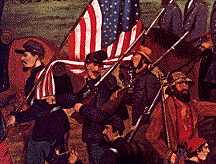
|
Crosslistings: AFAM 355 |

|
Crosslistings: AFAM 355 |
This course explores culture as an instrument of global diplomacy and its dramatic transformation of superpower relations in the Cold War era. During the Cold War, the dual problems of race and culture in America had to be addressed in an international context as they reshaped the image of American democracy worldwide. Students will examine the intersection of these dynamics in American relations with the Soviet Union and other regions of the world from 1945 to the 1990s. This approach to diplomacy underscores the centrality of Western intellectual forces in diminishing the credibility and appeal of Soviet communism in the Eastern bloc. Accordingly, students will look at how the appropriation of American cultural products dramatically eased U.S.-Soviet political tensions in the midst of such critical Cold War events as the Little Rock crisis, the dispute over the Berlin Wall, the Cuban missile crisis, American intervention in Vietnam, decolonization in Africa, the Soviet invasion of Czechoslovakia, and the fall of the Soviet Union. Students will become familiar with these issues by examining primary sources that will include not only critical documents of U.S. Cold War diplomacy but also major cultural products like musical theater, movies, and jazz that emanated from the United States, the former Soviet Union, and other regions of the world.
COURSE FORMAT: Seminar
Level: UGRD Credit: 1 Gen Ed Area Dept: SBS HIST Grading Mode: Graded
Prerequisites: NONE
Last Updated on MAR-30-2006
Copyright Wesleyan University, Middletown, Connecticut, 06459